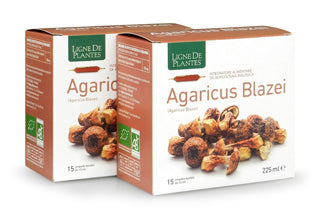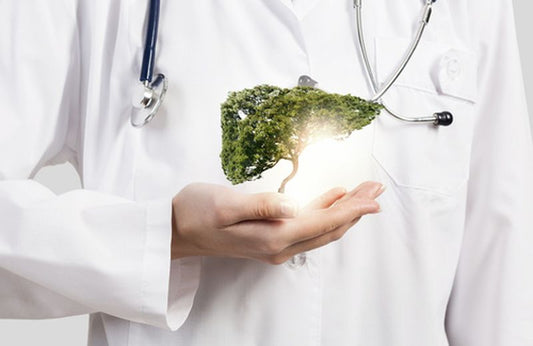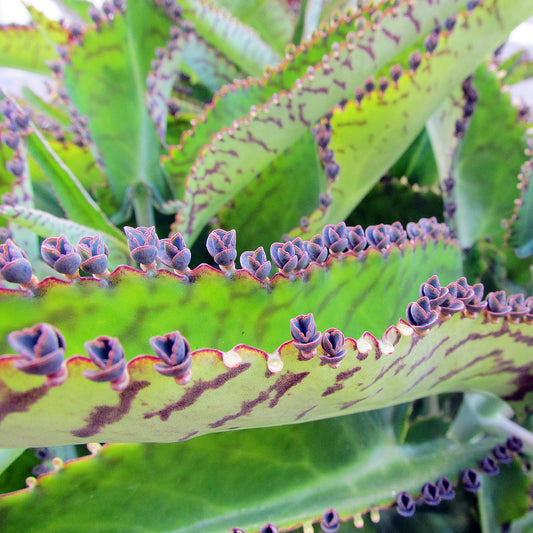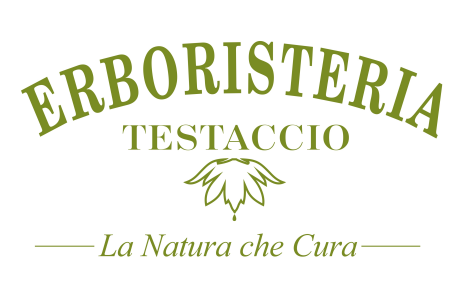Ligne De Plantes
Ligne De Plantes Agaricus Blazei BIO 15 ampoules of 15 ml
Ligne De Plantes Agaricus Blazei BIO 15 ampoules of 15 ml
Couldn't load pickup availability
Agaricus Blazei Murill is an edible medicinal mushroom of Brazilian origin. Traditionally used against a range of diseases, including cancer and chronic hepatitis, it has been grown commercially for the health food market.
According to one legend, elderly people living in Piedade outside São Paulo, Brazil, had fewer serious illnesses than those in nearby communities, and this condition had been associated with the use of Agaricus as food.
Over the years there have been numerous scientific studies carried out to demonstrate its notable immunomodulatory properties. In addition to cancer and chronic hepatitis, this mushroom has been used in folk medicine against a variety of diseases, including diabetes, atherosclerosis, and hyperlipidemia.(1)
Immunostimulation by medicinal mushrooms occurs via innate immunity and is typically mediated by phagocytic cells.
These cells use their own primitive and non-specific recognition systems, which allow them to bind a multitude of microbial agents and elicit so-called innate immune responses, through the secretion of proinflammatory cytokines (2,3), nitric oxide and hydrogen peroxide ( 4), lysosomal enzyme (5), activation of arachidonic acid metabolism (6) and chemokines. Indeed, phagocytic cells act as the first line of defense against infections together with natural killer (NK) cells and NK T cells.
Agaricus is rich in biological response modulators, such as proteoglucans and beta-glucans, which are powerful stimulators of macrophages, polymoronuclear cells (PMN) and NK cells.
Regarding in vivo effects, increased levels of cytokines IL-8 and TNF-alpha were observed in subjects who received Agaricus extract (7). In 2002, a study was carried out at the end of which it was found that the intake of Agaricus extract increased the number of cells in the spleen that produce antibodies (8), elevated serum levels of IgG and the number of T cells, as well as a increased phagocytic capacity of the PMN, induced by proinflammatory cytokines (9,10,11).
Interestingly, the regulatory gene of G protein signaling (RGS1), which is important for chemoattractant receptors, was also selectively upregulated by Agaricus extract in THP-1 promonocytic cells. The interferon alpha and beta receptor (IFNAR1) was also upregulated in peripheral blood leukocytes of patients with chronic IFN-alpha-resistant hepatitis C virus (HCV) infection after just one week of administration of the mushroom. (12)
Agaricus extracts have been successfully used as adjuvants in DNA vaccines to improve their efficacy against hepatitis B virus (HBV) and foot-and-mouth disease (FMDV) infection. Compared to DNA vaccine controls alone, mice that received the vaccine in combination with Agaricus extract had a significant increase not only in the specific antibody response, but also in T lymphocyte proliferation. (13,14)
Agaricus is also an excellent source of antioxidants, although to a slightly lesser extent than other Basidiomycete mushrooms (15). However, similar to proinflammatory cytokine-induced phagocytosis of Staphylococcus aureus and Mycobacterium tuberculosis by PMN, increased serum levels of proinflammatory cytokines MIP-2 (IL-8) and TNF-α after Agaricus treatment led to increased phagocytosis of Streptococcus pneumoniae.(16,17)
β-glucans also have known anti-tumor properties, as do proteoglycan and ergosterol, two other active ingredients of Agaricus [6, 58]. Beta-1,3/1-6-glucans from yeast and fungi have been used in various cancer clinical trials. (18,19,20)
The Dr. Ohno proposed that the mushroom's anticancer effects are due to β-1,3-glucan. Others have shown that a β-1,6-glucan, extracted from Agaricus, induced tumor regression in mice, and that daily β-glucan supplementation reduced spontaneous metastasis of ovarian and lung cancer cells. Treatment with β-glucans could, therefore, be beneficial for patients at risk of metastasis or with existing metastasis.(21,22,23)
In a related study, a β-glucan-protein complex isolated from Agaricus was shown to have an inhibitory action against Meth A fibrosarcoma in a mouse model (24). and the effect was attributed to the activation of NK cells and the induction of apoptosis (21).
Furthermore, it was reported that Agaricus treatment had an inhibitory effect on leukemic cells in patients with acute nonlymphocytic leukemia (25).
Other Japanese medical groups have demonstrated over the years that fat-soluble ergosterol reduced tumor growth and metastasis in mice bearing sarcoma and lung cancer (26). There are anecdotal reports of patients with hematological cancer who were cured, or experienced fewer side effects from chemotherapy, when they supplemented their prescribed hospital treatment with Agaricus extract. This is in line with a clinical report from South Korea in which treatment with Agaricus extract reduced chemotherapy side effects in gynecological cancer patients. It is important to recognize that, in addition to improving quality of life during chemotherapy, additional treatment with Agaricus significantly increased NK cell activity in these patients. (24,26).
INGREDIENTS per 15 ml ampoule:
Demineralised water - Concentrated orange juice - Concentrated lemon juice - 8/1 dry extract of Agaricus blazei fungal fruiting body* (Agaricus blazei)
* Ingredient from organic farming.
|
SUBSTANCES WITH NUTRITIONAL OR PHYSIOLOGICAL EFFECT per daily dose (15 ml) |
|
|
Dry extract 8:1 of fungal fruiting body of Agaricus blazei* (Agaricus blazei) |
250 mg |
USE TIPS:
Take one ampoule per day diluted in half a glass of water.
Share


Our philosophy
None of our products contain petroleum derivatives, silicones or preservatives such as paba, formaldehyde releases or chlorine derivatives. No preparation is identical to another just as no flower is identical to another. Our products stand out for the production and processing of raw materials in an artisanal way while respecting nature.
Our advice
View all-

Dr. Raniero Iacobucci Protocol For Prostatic Hy...
Raniero iacobucciBenign prostatic hyperplasia (BPH) is a common condition that affects men aged 50 and over and is characterized by a noncancerous (benign) enlargement of the prostate that can make urination...
Dr. Raniero Iacobucci Protocol For Prostatic Hy...
Raniero iacobucciBenign prostatic hyperplasia (BPH) is a common condition that affects men aged 50 and over and is characterized by a noncancerous (benign) enlargement of the prostate that can make urination...
-

Liver purification – Cholagogic remedies
Raniero iacobucciThe importance of the liver in human pathophysiology is now an undisputed fact. The liver is the largest gland in the entire body and represents the center of the body's...
Liver purification – Cholagogic remedies
Raniero iacobucciThe importance of the liver in human pathophysiology is now an undisputed fact. The liver is the largest gland in the entire body and represents the center of the body's...
-

Pure Kalanchoe daigremontiana juice
Raniero iacobucciPure Kalanchoe daigremontiana juice From next week, pure juice will be available at the Herbalist's shop, obtained from the cold pressing of fresh Kalanchoe daigremontiana leaves. Does it contain preservatives? Since...
Pure Kalanchoe daigremontiana juice
Raniero iacobucciPure Kalanchoe daigremontiana juice From next week, pure juice will be available at the Herbalist's shop, obtained from the cold pressing of fresh Kalanchoe daigremontiana leaves. Does it contain preservatives? Since...




